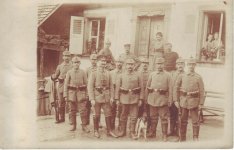You are using an out of date browser. It may not display this or other websites correctly.
You should upgrade or use an alternative browser.
You should upgrade or use an alternative browser.
This I Think Is One Of Those "There Are Decent People Here Treat Them Well" Photographs IR 5
- Thread starter Nickc
- Start date
Sandmann
Well-known member
Sorry Nick, but I think this view is a bit one-sided. The Germans often had good relations with French civilians wherever they met, including during World War I. This was already the case in the Franco-Prussian War of 1870/71. Whenever people from both countries met, they quickly realized that they had more in common than they thought.
Here are some examples of friendly looking French civilians with German soldiers in France:
A German lieutenant colonel with his landlady and other German officers on the Western Front in France / 1915 (Source: Süddeutsche Zeitung Photo, Historische Archive - Series: German occupation of France and Belgium, 1914-1918 - Copyright: Scherl/Süddeutsche Zeitung Photo)
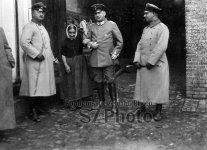
German soldiers with a French grandmother by a fireplace on the Western Front in France / 1915 (Source: Süddeutsche Zeitung Photo, Historische Archive - Series: German occupation of France and Belgium, 1914-1918 - Copyright: Scherl/Süddeutsche Zeitung Photo)
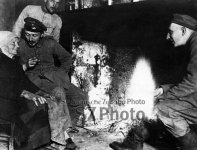
German soldiers patrol French residents left behind in a town in Champagne in France / 1916 (Source: Süddeutsche Zeitung Photo, Historische Archive - Series: German occupation of France and Belgium, 1914-1918 - Copyright: Scherl/Süddeutsche Zeitung Photo)
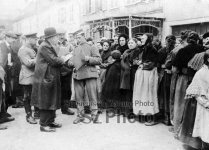
Here are some examples of friendly looking French civilians with German soldiers in France:
A German lieutenant colonel with his landlady and other German officers on the Western Front in France / 1915 (Source: Süddeutsche Zeitung Photo, Historische Archive - Series: German occupation of France and Belgium, 1914-1918 - Copyright: Scherl/Süddeutsche Zeitung Photo)

German soldiers with a French grandmother by a fireplace on the Western Front in France / 1915 (Source: Süddeutsche Zeitung Photo, Historische Archive - Series: German occupation of France and Belgium, 1914-1918 - Copyright: Scherl/Süddeutsche Zeitung Photo)

German soldiers patrol French residents left behind in a town in Champagne in France / 1916 (Source: Süddeutsche Zeitung Photo, Historische Archive - Series: German occupation of France and Belgium, 1914-1918 - Copyright: Scherl/Süddeutsche Zeitung Photo)

Nickc
Active member
Hi Sandy
This COVID means I am around at strange times.
My statements applied only to Belgium and are based on things I have read in memoirs from German soldiers, letters they wrote home, the historical record of the franc tireurs, Louvain and I have Belgian ascestry. My maternal great grandmother and grandmother were both from a village between Liege and Namur. I had a great Uncle who was nine years old and watched the battle for Liege from the hills above it.
My second language is French, and the Belgians remember to this day what happened, for the first years of my life to I thought the French for German people was "Les salles Boches".
Absolutely awful way to think of people when I found out the truth, I have always tried to put a stop to it.
My first views of pickelhaubes were painted red and hung from chains with flowers in!!
The fact is the Germans behaved very badly in Belgium because Belgium dared to stand up to them.
Photgraphs are like statistics they tell the story the photograph wishes to them to tell.
From the 1000's I see every year they fall into three categories Comdradeship, Patriotism and Propaganda. coupled with I have done a lot of defence contracts producing software for amongst other things analysis of photographs.
I had to work with experts in this field as they taught me the rules and basic facts that are needed to begin analysis:
1. Did the old woman in the first photograph have choince on him being billeted with her
2. No she did not, so she is actually in an inferior poisiton before you include her sex and age
3. She is not looking at the camera she is looking at the floor, that speaks volumes
4. The Officer on the right is looking at the old woman not the camera drawing attention her, "look aren't we nice", fails becasuse she is looking at the floor.
5. You could wonder what threats or bribes were offered to a confused old woman to make her take part.
In my opinion that is nothing more that posed propaganda exploiting a confused old woman with threats or bribery
Photgraph 2
Again another confused old person propbably cold and hungry, sitting by a fire probably given a stiff drink and a tobacco pipe, again the woman is not looking at the camera
The next question is why do these pictures always have old women in?
Why not a middle aged woman who has a husband in the French Army?
Again this picture is posed propaganda in my opinion
Photgraph 3
I see a German soldier with a list telling people how it is going to be.
An old man is asking a question of the soldier while the rest of the crowd stand around bored and resigned to what they have no control over.
Another clue, no one is smiling, no one is talking.
In my opinion this was just a cynical photograph opportunity captioned to have little reflection on reality.
Sandy there are just my opinons and I hope I have not insulted or upset you, but I would be interested to hear what you think of these photographs when applying my comments.
Nick
This COVID means I am around at strange times.
My statements applied only to Belgium and are based on things I have read in memoirs from German soldiers, letters they wrote home, the historical record of the franc tireurs, Louvain and I have Belgian ascestry. My maternal great grandmother and grandmother were both from a village between Liege and Namur. I had a great Uncle who was nine years old and watched the battle for Liege from the hills above it.
My second language is French, and the Belgians remember to this day what happened, for the first years of my life to I thought the French for German people was "Les salles Boches".
Absolutely awful way to think of people when I found out the truth, I have always tried to put a stop to it.
My first views of pickelhaubes were painted red and hung from chains with flowers in!!
The fact is the Germans behaved very badly in Belgium because Belgium dared to stand up to them.
Photgraphs are like statistics they tell the story the photograph wishes to them to tell.
From the 1000's I see every year they fall into three categories Comdradeship, Patriotism and Propaganda. coupled with I have done a lot of defence contracts producing software for amongst other things analysis of photographs.
I had to work with experts in this field as they taught me the rules and basic facts that are needed to begin analysis:
1. Did the old woman in the first photograph have choince on him being billeted with her
2. No she did not, so she is actually in an inferior poisiton before you include her sex and age
3. She is not looking at the camera she is looking at the floor, that speaks volumes
4. The Officer on the right is looking at the old woman not the camera drawing attention her, "look aren't we nice", fails becasuse she is looking at the floor.
5. You could wonder what threats or bribes were offered to a confused old woman to make her take part.
In my opinion that is nothing more that posed propaganda exploiting a confused old woman with threats or bribery
Photgraph 2
Again another confused old person propbably cold and hungry, sitting by a fire probably given a stiff drink and a tobacco pipe, again the woman is not looking at the camera
The next question is why do these pictures always have old women in?
Why not a middle aged woman who has a husband in the French Army?
Again this picture is posed propaganda in my opinion
Photgraph 3
I see a German soldier with a list telling people how it is going to be.
An old man is asking a question of the soldier while the rest of the crowd stand around bored and resigned to what they have no control over.
Another clue, no one is smiling, no one is talking.
In my opinion this was just a cynical photograph opportunity captioned to have little reflection on reality.
Sandy there are just my opinons and I hope I have not insulted or upset you, but I would be interested to hear what you think of these photographs when applying my comments.
Nick
Sandmann
Well-known member
Nick, I hope we can have different opinions without feeling offended. Anyway, I don't feel offended just because you're trying to change my mind.
I agree with you that the Germans in Belgium have behaved indescribably harshly and, to me, also disgustingly. But the violence wasn't baseless, consider they thought they were punishing attacks on civilians in violation of the Geneva Conventions. Recent research even gives reason to believe that the Franctireurs can no longer be dismissed as a pipe dream of the Germans. In their book, Horn/Kramer demonstrably made many mistakes in the choice of sources and analysis and simply ignored German sources. Franctireurs seem not only to have shot at Germans in isolated cases.
Concerning the photos I have following opinion:
German soldiers and a girl at a well in a village behind the front lines in France during the First World War - France / 1916 (Source: Süddeutsche Zeitung Photo, Historische Archive - Series: German occupation of France and Belgium, 1914-1918 - Copyright: Scherl/Süddeutsche Zeitung Photo)
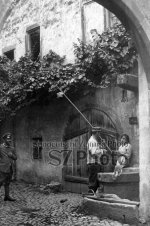
French women washing clothes in a village in the Vosges during the First World War. A German soldier smokes a pipe and talks to a woman - France / 1916 (Source: Süddeutsche Zeitung Photo, Historische Archive - Series: German occupation of France and Belgium, 1914-1918 - Copyright: Scherl/Süddeutsche Zeitung Photo)
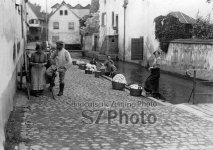
I agree with you that the Germans in Belgium have behaved indescribably harshly and, to me, also disgustingly. But the violence wasn't baseless, consider they thought they were punishing attacks on civilians in violation of the Geneva Conventions. Recent research even gives reason to believe that the Franctireurs can no longer be dismissed as a pipe dream of the Germans. In their book, Horn/Kramer demonstrably made many mistakes in the choice of sources and analysis and simply ignored German sources. Franctireurs seem not only to have shot at Germans in isolated cases.
Concerning the photos I have following opinion:
- Yes, the Germans were not voluntarily admitted to the houses. But the Germans weren't monsters who threatened people, bribed them, or used violence for no reason. As I wrote, there is a dissertation that proves that mutual prejudices have often subsided where French and Germans have come into private contact.
- Considering the photos as propaganda would fit nearly any war photo. But I in my opinion the photography was not yet digital and the moment of the right photo could not be well defined. So they are not posed as they are today.
- I wouldn't deny old people their spiritual maturity either. Sometimes people from back then seem older because they had to work much harder.
German soldiers and a girl at a well in a village behind the front lines in France during the First World War - France / 1916 (Source: Süddeutsche Zeitung Photo, Historische Archive - Series: German occupation of France and Belgium, 1914-1918 - Copyright: Scherl/Süddeutsche Zeitung Photo)

French women washing clothes in a village in the Vosges during the First World War. A German soldier smokes a pipe and talks to a woman - France / 1916 (Source: Süddeutsche Zeitung Photo, Historische Archive - Series: German occupation of France and Belgium, 1914-1918 - Copyright: Scherl/Süddeutsche Zeitung Photo)

Nickc
Active member
No Sandy history is open debate and re-interpretation, it is good to discuss and learn, I will admit I am cynical.
I would never presume to change your mind, just offer offer what I saw.
I look at the second photograph and I see a conqueror forcing himself on woman, she is the conquered, has little choice and she is not making eye contact with, instead she is concentrating on what she is doing. The other women doing the washing and are laughing and posing for the camera and they are not engaged with the soldier.
My real knowledge is what happend in Belgium, its was savage, on both sides. The German Hussars and Uhlans being cavalry and viable recon for a shortwhile longer had a habit of riding ahead entering a village or town and hanging 5 or so residents "pour encouragez les autres". I have read this in at least three memoirs from soldiers published during the war, and my great uncle who was 9 witnessed this in a village near Namur.
I have heard tell about new evidence about franc tireurs and the real story, part of the problem was the Belgium army uniform with top hat looked civilian, the Germany Army was greener than green at the time, since 1870/71 they had only fought two minor colonial wars in 1904 and 1907 I think, not sure about the 1904 date. So the troops were green, nervous and in many instances had been drinking so there blue on blues for which the civilians as the soldier radnomly fired into any windows with lights on.
As always there are two sides to story, random chance and just bad luck, I dont hold anything against the Germans of the first war I have read so many books and letters that they pass the I would have a beer with you and talk test. The period 1933-1945 I would rather not make my views public on.
I have had the good fortune to live and work in Frankfurt at the end of the last century, and I absolutely loved it, the people are wonderful, the food!!! Too many legs of roast pork, mashed potato and sauerkraut, oh and that dangerous schnapps they have there floating in a stein of beer!
One thing that did surprise was the German guy I was doing the work was nervous about WW2 which genuinely surprised me. My reply it was something our fathers or grandfathers, nothing to with either of us, bought a big smile to his face and as the expression goes we proceeded to get shitfaced.
The great thing about discussion we both learn and gain insights into other peoples knowledge and points of view.
Always a pleasure to talk to you Sandy
I would never presume to change your mind, just offer offer what I saw.
I look at the second photograph and I see a conqueror forcing himself on woman, she is the conquered, has little choice and she is not making eye contact with, instead she is concentrating on what she is doing. The other women doing the washing and are laughing and posing for the camera and they are not engaged with the soldier.
My real knowledge is what happend in Belgium, its was savage, on both sides. The German Hussars and Uhlans being cavalry and viable recon for a shortwhile longer had a habit of riding ahead entering a village or town and hanging 5 or so residents "pour encouragez les autres". I have read this in at least three memoirs from soldiers published during the war, and my great uncle who was 9 witnessed this in a village near Namur.
I have heard tell about new evidence about franc tireurs and the real story, part of the problem was the Belgium army uniform with top hat looked civilian, the Germany Army was greener than green at the time, since 1870/71 they had only fought two minor colonial wars in 1904 and 1907 I think, not sure about the 1904 date. So the troops were green, nervous and in many instances had been drinking so there blue on blues for which the civilians as the soldier radnomly fired into any windows with lights on.
As always there are two sides to story, random chance and just bad luck, I dont hold anything against the Germans of the first war I have read so many books and letters that they pass the I would have a beer with you and talk test. The period 1933-1945 I would rather not make my views public on.
I have had the good fortune to live and work in Frankfurt at the end of the last century, and I absolutely loved it, the people are wonderful, the food!!! Too many legs of roast pork, mashed potato and sauerkraut, oh and that dangerous schnapps they have there floating in a stein of beer!
One thing that did surprise was the German guy I was doing the work was nervous about WW2 which genuinely surprised me. My reply it was something our fathers or grandfathers, nothing to with either of us, bought a big smile to his face and as the expression goes we proceeded to get shitfaced.
The great thing about discussion we both learn and gain insights into other peoples knowledge and points of view.
Always a pleasure to talk to you Sandy
Interesting discussion; the propaganda from both sides makes it very difficult to find anything close to the truth.
Imo propaganda then was no less advanced than it is now, and the photographers no less skillful.
I’ve read the same comments in German autobiographies about trusting the French-speaking population a lot less than the Flemish-speaking, and always thought that this was caused by the fact that Flemish is easier to understand for a German than French.
Regards,
Lars
Imo propaganda then was no less advanced than it is now, and the photographers no less skillful.
I’ve read the same comments in German autobiographies about trusting the French-speaking population a lot less than the Flemish-speaking, and always thought that this was caused by the fact that Flemish is easier to understand for a German than French.
Regards,
Lars
Sandmann
Well-known member
Nick, your family background touches my heart and I'm glad that we are closer together in most of the european countries these days. Up until 10 years ago, I even would not have thought that we would have to think again about greater wars, even with Russia. Concerning ww2, you are absolutely right. As a German I can‘t apologize myself enough for the crulels of our ancestors. But I also think that ww1 was not our fault.
In my opinion, if she was harassed by the soldier, the other young women would not look cheerfully at the camera.
Nick, it was a pleasure to discuss with you. But I would like to stop here, otherwise I would be typing mountains of words and maybe lose my fingertips As Lars wrote, today it is hard to find the truth anymore. If I give you a source, you give me another, both with completely different evidences and conclusion…and there are hundreds of sources about ww1.
As Lars wrote, today it is hard to find the truth anymore. If I give you a source, you give me another, both with completely different evidences and conclusion…and there are hundreds of sources about ww1.
But it's nice that we can discuss history in a friendly manner without attacking each other. Hopefully this spirit will remain for now and generations to come

You are right, the young woman is looking down but she is reading something on a paper in her hands and could also be shy. Her body language shows no sign of fear. She casually leans against the cart, one foot off the hook. If she were afraid, her body would be tensed in some way.I look at the second photograph and I see a conqueror forcing himself on woman, she is the conquered, has little choice and she is not making eye contact with, instead she is concentrating on what she is doing. The other women doing the washing and are laughing and posing for the camera and they are not engaged with the soldier.
In my opinion, if she was harassed by the soldier, the other young women would not look cheerfully at the camera.
Nick, it was a pleasure to discuss with you. But I would like to stop here, otherwise I would be typing mountains of words and maybe lose my fingertips
But it's nice that we can discuss history in a friendly manner without attacking each other. Hopefully this spirit will remain for now and generations to come
Nickc
Active member
It was a great discussion and I agree it has run its course.
Agree totally Germany was not to blame for WW1, I blame Austria and the vainglorious fool Franz Josef.
I too had high hopes for Europe and sorry to some of my fellow countrymen but I will never understand Brexit or why they voted for it, and now I feel like foreigner in Europe. Must get to Germany before they put speed limits on the autobahn give the M5 one last serious blast, that's my other German passion BMWs.
Its been great discussion, history I personally believe is never settled there is always new evidence turning up to make us re-evaluate what we thought we knew.
Thank you Sandy for all the help you have given and I look forward to more interesting conversation in the years to come.
Nick
Agree totally Germany was not to blame for WW1, I blame Austria and the vainglorious fool Franz Josef.
I too had high hopes for Europe and sorry to some of my fellow countrymen but I will never understand Brexit or why they voted for it, and now I feel like foreigner in Europe. Must get to Germany before they put speed limits on the autobahn give the M5 one last serious blast, that's my other German passion BMWs.
Its been great discussion, history I personally believe is never settled there is always new evidence turning up to make us re-evaluate what we thought we knew.
Thank you Sandy for all the help you have given and I look forward to more interesting conversation in the years to come.
Nick
Nickc
Active member
Hi Lars I agree with the language similarity as I started learning German I found that I could start to understand some Flemish, I read somewhere that the Flemish felt closer to German politically and culturally, It must also be said there is no love lost between Wallons and Flemings, the Wallons historically regarded the Fleiming as thick as pigshit. My family are Wallons but I have no comment on this as I have never met enough Flemings to form my own opinion!Interesting discussion; the propaganda from both sides makes it very difficult to find anything close to the truth.
Imo propaganda then was no less advanced than it is now, and the photographers no less skillful.
I’ve read the same comments in German autobiographies about trusting the French-speaking population a lot less than the Flemish-speaking, and always thought that this was caused by the fact that Flemish is easier to understand for a German than French.
Regards,
Lars

